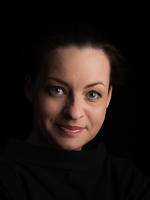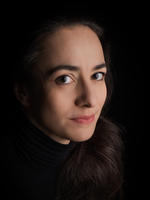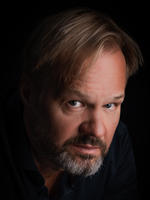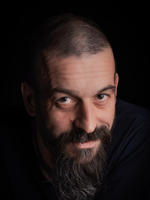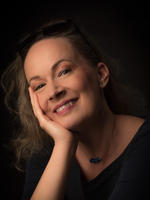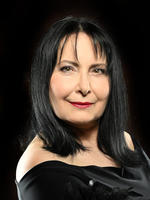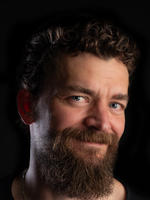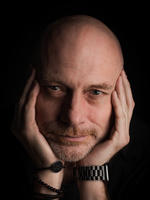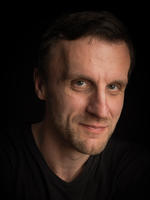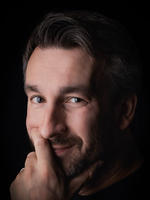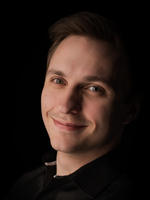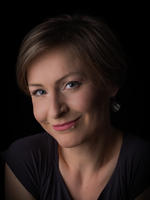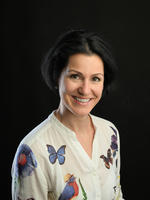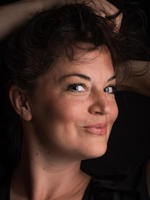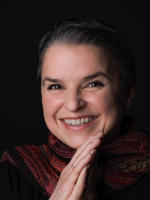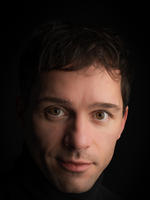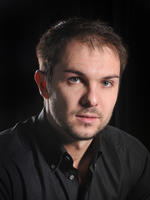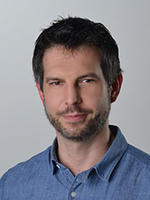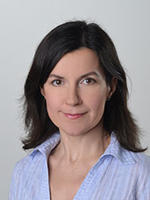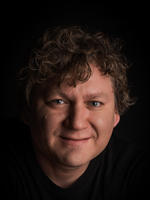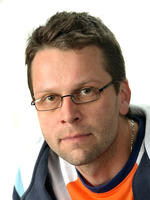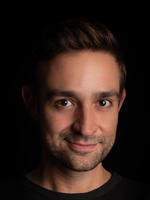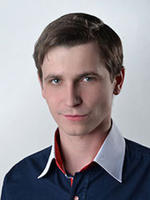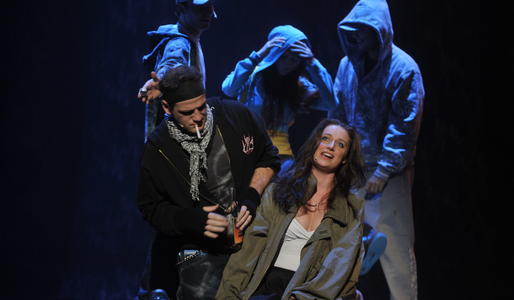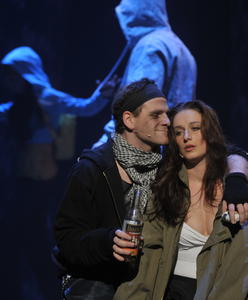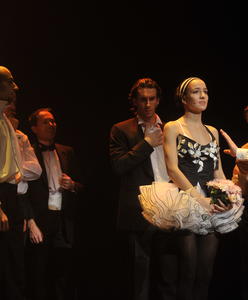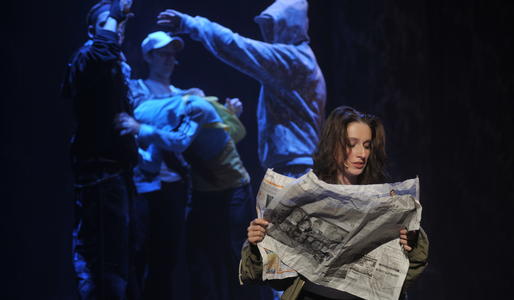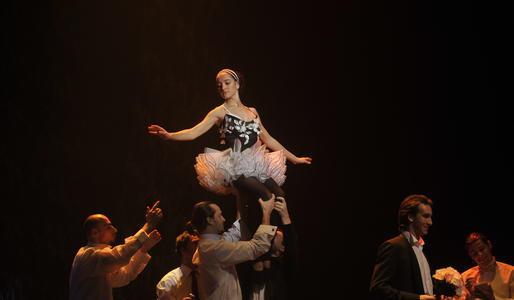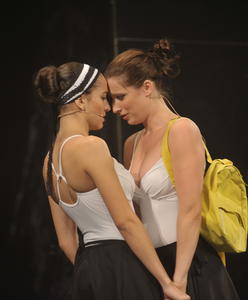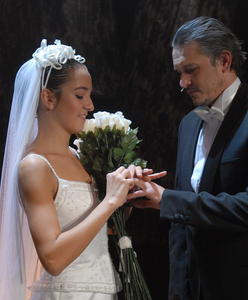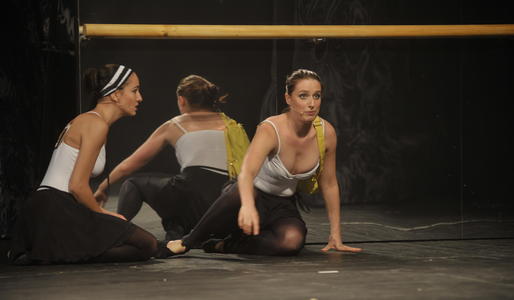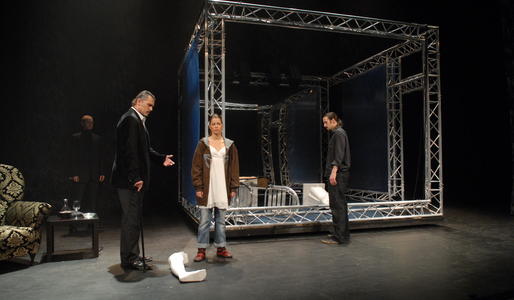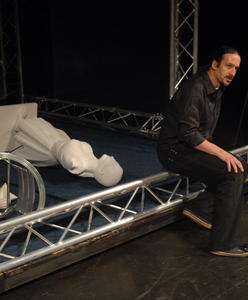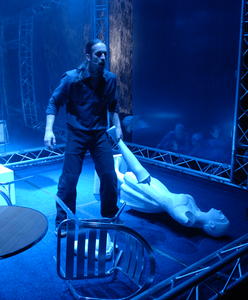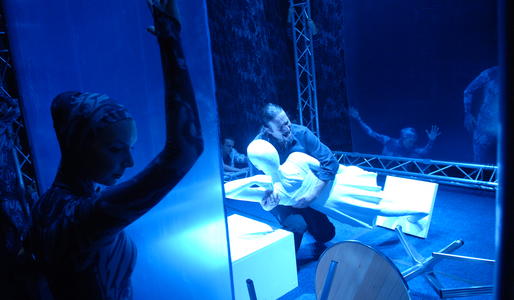Inferno - a philosophical as well as artistic concept
Tomáš Hejzlar 12. February 2009 zdroj Haló noviny
About the new musical production by Brno City Theatre
Many of us still remember the sometimes also non-functional phrases about so-called engaged art. The essence of these phrases cannot be ruled out, of course, if it is not deformed and misused. Then, the phrase 'engaged art', which is often made fun of at present, has its sense and social meaning. It was valued in antiquity and in the Middle Ages, and is also valid in our time.
At the beginning of the nineties, when also many obviously positive, traditional artistic values tumbled down, I perceived the transformation of the then Theatre of the Mrštík Brothers in Brno into a new conception, Brno City Theatre, with certain (and obvious!) displeasure. I was afraid that their undeniable and notable qualities would be devastated and degraded into the adventurous and irresponsible avant-garde performances that were fashionable at that time. After all, we have witnessed that on several Czech and Moravian stages - and in many places, this situation has lasted for whole two decades…
However, I soon found out that the newly conceived trends of Brno City Theatre have a completely different character: they are sophisticated, they have an artistic base and are often ruthlessly topical. They don't just follow the easy-to-like glitter of snobbish popularity or box office success, as we witness mainly on Prague's musical stages (the recent artistically shallow and insensitive transcript of Hašek's Svejk or the renewed artistically unsuccessful weak premiere of the musical Dracula are the most topical proofs of this).
In contrast, Brno's musicals, in which the composers Zdenek Merta and Petr Ulrych and the experienced librettist Stanislav Moša (the successful director of Brno City Theatre who has now also internationally established himself as a respected director) contribute most frequently, have followed in the footsteps of the Moravian tradition mainly from the sixties and seventies (for example, the productions by the composer Miloš Štědroň). The contemporary selection of musical hits they have produced since the beginning of the nineties is not only artistically original but also exclusively topical – they usually deal with interpersonal relationship issues in connection with aspects of wider society). And this at a top artistic level which doesn’t have to rely on advertising, which can often be of the hidden, but certainly very well paid for variety. The evidence of Brno’s success is also their international prestige; the occasional sour utterances of the grudges held by naïve Prague writers cannot overshadow the evaluation of experts.
When the Brno producers showed the original musical Inferno from the production workshop of Merta - Moša on the stage of the Music Theatre of Brno City Theatre, evaluators as well as the public have compared it, obviously, with the overall level of musicals in our country and abroad, as well as by making comparisons over time. And I did the same thing as well, of course. In comparison with the Golem-like overproduction of other musicals of a barely average level and often also kitsch conception, this new Brno production is again a pearl. Moša has the perfect ability to find an expressive abbreviation, one which simultaneously accepts the artistic and mainly the aesthetic substance.
Moša, as a long-active as well as internationally successful principal has been following two basic principles on a long-term basis: artfulness (and a positive aesthetic (i.e. also a moral) consequence which is connected with it) and a level of ideas, of straight philosophy. This was also true for previous musical productions: every title dealt with certain problems of society without sermonizing or courting popularity with the audience. They asked questions completely straightforwardly, they don't look at the current political atmosphere but they also don't rely primarily on criticism.
At the same time, this reveals a way to the finding of answers in accordance with Čapek, Dostoyevsky, Remarque, Tolstoy and other great personalities. Moša's librettos are usually quality ones (or at least inventive) as far as rhyme-forming substance is concerned, but at the same time, they are not embarrassing rhymes which can so often be found basically on all musical stages (with the exception of Karlín Music Theatre). In fact, this makes Moša's work different from the productions in other European cities - including the musical empires Berlin, Budapest or Vienna. Brno thus follow the positive musical trends of the sixties when the inflation of musical show business wasn't functioning as visibly as it is now, but on the contrary, creative prestige was a priority.
In this case it is not only a somewhat characterless (or rather soulless) rhymed - and often very naïvely! - dusting off of a well known topic, like Cleopatra, the tale of the Golem and others, but a manifestation of real philosophical substance with updating overlap. And so also Moša's Inferno is not just a copy of what was created by Dante Alighieri, Johann Wolfgang Goethe and other wise spirits of international culture, but a characterful re-write which respects the deeper ideals and wider ideas while perceiving the topic as a current problem. As- let's quote the classic - where we are is hell, and where hell is there we must ever be. When all the world dissolves, and every creature shall be purified, all places shall be hell that are not heaven.
Even though the premiere of this new musical piece took place in October last year (let's add, however, the time for the creation of the score and the time needed for the production!), that is in the period when the present ruling Czech politicians were vehemently trying to downplay the possibility of the arrival of the current world crisis also to the Czech Republic, it is a topic which clarifies human characters and reveals human greed right in this period of the economic and financial collapse of dishonest capitalist entrepreneurship.
A young sculptor, David, (could there be some relation to Michelangelo's work?) impressively performed by the experienced Stanislav Slovák, is in a relationship with a dancer, Lena Paulová, who is masterfully acted by Radka Coufalová. The described case contains within itself a comic parody as well as expressive harshness, emotive ethereality as well as devilish rebellion from the very beginning, expressed in the environment of a contemporary ballet audition which informs the spectators that this is not a medieval myth but an image of our time. From that moment on, we can watch the changes through the scenes with individual problems (e.g. the separation of the two sisters, the successful and the unsuccessful one - which is another theme!) and collective ones (including a parody on vanity during a scene at a ball or a minister's condescending snobbish elitist vanity etc.) This is intertwined with ever-present everydayness, from the drunk dancing of a group of young adolescents up to the topic of divorce (the baroness' sung monologue is one of the melodically most distinct of all), which has its counterpoint in those infernal scenes with perfectly elaborated and softly-applied choreography, and with the use of such elements as a voice band, etc.
There are really many themes - however, this intensive variety of ideas with thematic diversions does sometimes deaden the spectators' attention, i.e. also their ability to immediately orient themselves in the story's development. It seems that the first part of the intended trilogy would actually be successful split into at least two independent performances - and these could perhaps also be drama productions.
Together with the main actors (and their alternates Petr Gazdík and Svetlana Slováková), the other acting performances are also perfectly convincing and show spontaneous understanding - their technical abilities are a given, of course! This all develops with the perfect cooperation of all the elements, the positive evaluation of which would already unnecessarily exceed the framework of this article.
In the case of Brno's Inferno, it is not a cheap and primarily almost servilely impressive piece of entertainment on a level which often approaches the pathetic, aspects which prevail in Prague productions (which are, on top of that, often heavily subsidized financially!); on the contrary, Brno's producers rather intended to provoke deeper contemplation. And by this they have returned to the basics of this genre: to entertain tastefully but also address with values. And here we could repeat: really engaged art mustn't be a mere poster with political proclamations, but has to really please and enthuse with its principles built on values, as was often demonstrated by our left-wing producers in the past - in Brno, for example, by Jiří Mahen and others. Brno City Theatre successfully follows in their footsteps.
Tomáš Hejzlar, Haló noviny, 12. 2. 2009
The hell which we live
Iveta Macková 1. December 2008 zdroj Kult.cz
The world premiere of the first part of the loose musical trilogy "A Fateful Comedy", named "Inferno", was put on by the Music Stage of Brno City Theatre midway through October. As has happened many times before, the creative team behind this work is the proven pair made up of music composer Zdenek Merta and director Stanislav Moša.
Their Inferno is inspired by Alighieri's trilogy, The Divine Comedy, but mainly in terms of ideas and feelings, not in content. Moša's Inferno presents the hell in which we live. Just as with the original trilogy, the play is not conceived as three connected parts running one after another, but rather as separate pieces with one common denominator, the purification of man.
The main characters of Inferno are two sisters, professional dancers who are looking for a good job. However, only one of them is successful - Lena (Radka Coufalová). From there, Lena sets off on a journey of success and prosperity, while Lucie (Hana Holišová) remains on the street, surrounded by criminality, drugs and violence. These two different worlds offer the producers great possibilities for breaking new personal ground in terms of the imagery used, as well as of dancing, singing and of course, acting.
The author of many scenic images, ranging from the modern to the dramatic and the normal, is Jaroslav Milfajt, and Andrea Kučerová created a mixture of costumes. Part of the production is the music by Zdenek Merta, which is, however, more of an accompanying, rather than particularly inventive or strengthening element. It is a completely different situation with Lucie Holánková's choreography, which managed to intermingle the acting and dancing parts excellently, naturally and artfully.
This new musical production offers, apart from very solid acting, singing and dancing performances, also a great live show full of dramatic as well as optical effects, changes and tricks. However, it mainly addresses the spectators with a suggestion or reminder of how and in what we live, who we live next to and with what kind of conscience or moral principles…
'Inferno' as an illustration of life
Miloš Hudec 13. November 2008 zdroj Echo
Our Brno can be characterised from many angles. The most recent truism could be that Brno is a city of theatres. The traditions, current situation, importance and physical state of our theatrical buildings fully confirm this.
Each of our theatres has a different smell, colour, and also artistic level. Brno City Theatre has been standing on the highest rung of the ladder for quite a few years now. Under the leadership of its principal, Stanislav Moša, it constantly displays the very highest quality in terms of repertoire, commitment to proper direction, creativity and acting, stage sets, costumes and of course the musical elements of theatre. It should be said that every performance of this theatre is thanks to the efforts of ex-minister Pavel Dostál, one of the creators of the Music Stage, who, unfortunately, is no longer with us today.
On 18th October 2008 the auditorium of Brno City Theatre's Music Stage was filled to the last seat by an audience who had come to see the world premiere of the first part of the musical trilogy, Inferno, Purgatory and Paradise. The proven authorial duo Stanislav Moša and Zdenek Merta have labelled Inferno "a fateful comedy", although it fills one with various thoughts that are definitely not comic. Moša gave full reign to expression of his philosophical approach to life, and Merta, as usual, continued in the tradition of the greatest creators of music of times past. Both of their approaches, however, are youthful, original, modern and mainly deep in feeling. The theatre is full of what must be every creative, artistic and acting expression. Scenic elements alternate with singing, costumery, music, choreography and interpretational ideas of the highest international standard. One watches the creators with respect as they employ completely new, difficult and original ideas. If we wished to characterise the plot, most significant are the concepts of love, freedom, freedom of action and sacrifice, but also tragedy, violence and speculation: "Everything we see is but an illusion."
Stanislav Moša, the director of this performance, involved his closest permanent collaborators in the creation of the piece. Scenographer Jaroslav Milfajt, costume designer Andrea Kučerová, conductors Jiří Petrdlík and Dan Kalousek, and music arranger Igor Vavrda, choreographers Lucie Holánková and Leona Kvasnicová. More than eighty actors walked the stage. Let's name at least Radka Coufalová, Hana Holišová, Svetlana Slováková, Marta Prokopová, Petr Gazdík, Stanislav Slovák, Petr Štěpán, Martin Havelka, Jan Apolenář, Alena Antalová, Zora Jandová, Dušan Vitázek and Ján Jackuliak.
To conclude let's just mention Merta's dramatic music and the world-class idea with the musical glass cube at the end of the play. Even that created something from this performance that is unforgettable.
"Inferno", or the first part of a "Fateful Comedy" - a new milestone for musical theatre in the Czech Republic?
Ondřej Doubrava 24. October 2008 zdroj Musical.cz
Today, Zdenek Merta and Stanislav Moša are respected personalities of Brno's musical theatre scene. This situation ought to be true on a national scale; for their efforts in producing totally original Czech works it would be entirely deserved […] Whenever Brno City Theatre puts on one of their joint works, absolute madness breaks out and all the tickets are taken by the second day of advance booking (most of them on the first day though). Their works used to be extremely popular in Prague, but they haven't been hosted there for a long time and, totally undeservedly, are starting to be forgotten. The current generation of Prague musical fans no longer has the chance to experience their work, which is definitely a sad state of affairs and one which should be remedied in the future.
In Brno, however, every one of their jointly-authored works is highly anticipated, as they always bring a new dose of originality to the stage. Not only that, the main point of their musicals is maybe not so much entertainment as rather to provoke you into thought. Even the high-spirited Shakespeare adaptation "Midsummer's Night's Dreams" will leave you gaping at how well the creators have described male-female relationships. "World Full of Angels" psychologically breaks you up into pieces in order to put you back together again at the end, possibly with the conviction that you should put more effort into changing your life. And in the "Garden of Miracles" you have to really get involved in the action. These works definitely can't be compared with the relaxing, passive entertainment that makes up the majority of fare in the musical genre. Merta and Moša's works truly are in a class of their own. So, in that case, what is their Ovid and in its title Dante-inspired original "Inferno" like?
Intriguing
At the beginning the plot follows two sisters - talented dancers who are taking part in theatre auditions. While the main heroine Lena, thanks to her success, becomes a national celebrity, her sister Lucie ends up devastated and living with a group of friends in a squat. Though they are separated, they never stop thinking about each other. Lena enters a relationship with Sebastian, a married but wealthy aristocrat. After his wife commits suicide he takes her as his wife, and gets a strange idea. He has the talented sculptor David create a statue of her. During his work the sculptor also falls under Lena's spell, and they gradually become closer. Lena still longs for her sister, and their fates cross once again. During one of their planned meetings Lena dies as the result of an accident. Sebastian blames David and decides to make his life HELL… Hell is actually the life which we live, or so the official idea behind this work says. Not only that, the sister, Lucie returns, and is forced to take the place of dead Lena in Sebastian's diabolical game. In the meantime David is suffering as Sebastian's prisoner.
Shocking
Advance warning must be given of the fact that it's best to see the performance at least twice, because this is maybe the authors' most difficult work for the viewer to digest. Of course it happens with the presence of Moša's individual poetic style, where you ponder (and gladly) over every word and verse and continually search for new meanings in even the simplest connections. Even so, particularly the first half the production doesn't seem to be completely cohesive. The action is relatively fragmented across many different places and it is harder to grasp connections. So one can get a bit of a shock from what's going on up on the stage. And in connection with this is the next point….
Aggressive
This is mainly due to the amount of sensations which you have to absorb over the roughly three hours in your seat. Jaroslav Milfajt's scenography is the reason, and it is used to the full here. Lucie Holánková's wide-ranging ballet choreography also earned long ovations on the open stage.
Varied
Certainly, as far as the variety of environments and the music aspect are concerned. Zdenek Merta again playfully jumps from pop to marvellous extensive passages of classical music (which is maybe the absolute best part of "Inferno"), through requiem, up to what is almost unadulterated rock 'n' roll. In short, what we've come to expect from him. Again, he produces his high standard with several moments of genius - however, we'll come back to the music later.
Charming
The performance contains several totally charming scenes, not quite as far as effects are concerned, but you will certainly enjoy the already mentioned dance scenes, or Lena's adorably winsome solo when she reveals her full character to David. Let's also mention the scene which takes part at the fair, complete with acrobats, a shooting gallery as well as a haunted house. It will be interesting to observe how many people will accuse the creators of complete kitsch because of those few minutes (and one perfect song).
Playful and musical
This paragraph contains the evaluation of the acting and singing performances. And as always, it is most pleasant to watch the ensemble of Brno City Theatre, which had a lot of dancing to do this time, too. You can spot practically immediately the fact that the main (double) role of Lena was tailor-made for Radka Coufalová, and her performance is, traditionally, unbelievably complex as far as all three aspects - acting, singing and movement - are concerned. Also, Hana Holišová has some beautiful moments on the stage in the role of Lucie. Stano Slovák performs excellently in the role of the sculptor David. The scenes in the glass prison create an unbelievably strong and moving impression.
Impressive, or an overall view of the performance through the eyes of an ordinary spectator
Thanks to all the described individual components and they way they fit into one another, spectators will enjoy a somewhat strong experience that they will probably have a hard time getting out of their head over the following weeks. In other words, according to the reactions gained so far they will most certainly leave the theatre immensely pleased.
A recapitulation or overview of the performance from the standpoint of long-standing supporters and admirers of the authorial duo.
Those members of the audience who are very familiar with the works of the Merta–Moša duo will probably be surprised how much "Inferno" is similar to "World Full of Angels". The ends of both pieces in particular are basically identical. In the music you will hear aspects of previous works, whether it be "Midsummer Nights' Dreams", or the already mentioned "World Full of Angels", and you will certainly hear a piece of "Bastard" as well. Simply a retrospective as it should be. It didn't use to be like this at all in the previous works, or only to a small degree. But perhaps even these spectators will find original elements in "Inferno" upon a second listening, on gaining a second impression. It is a performance which has no parallel in the domestic musical scene today.
The Inferno is within us..!
Peter Stoličný 22. October 2008 zdroj Musical-opereta.cz
The composer Zdenek Merta and the librettist, director and manager of Brno City Theatre, Stanislav Moša, presented an original musical, Inferno, at Brno City Theatre's Music Theatre in October 2008. It is the first part of an announced trilogy. Purgatory and Paradise shall follow. So let's have a look at the latest addition to the authorial duo M & M's continuous output, which runs from The Midsummer Nights' Dreams, Bastard and Babylon, to World Full of Angels and the Garden of Miracles. How are all these productions connected to their latest "piece"?
Everything is, of course, connected to everything in the same way as everything is related to everything. Both in the libretto and in the music of Inferno, a proximity to and some kind of continuation of Bastard can be perceived - a work that is so far, and not only in my opinion, the most consistent production from this creative workshop. If it didn't sound so unusual in connection with musical theatre, I would call both Bastard and Inferno philosophizing musicals. And it isn't only because of the outer, formal affinity (Bastard and his dispute with the devil). In Inferno, it seems as if the authors went further in asking questions and looking for answers. In accordance with the philosophy of Sören Kierkegaard they don't look for hell outside, but inside of human beings. Inferno becomes not the topography of a place but rather an omnipresent place. As Goethe said in Faust, through the mouth of Mephistopheles: “Hell has no limits nor is circumscribed, in one self place; for where we are is hell, and where hell is there must we ever be: and to conclude, when all the world dissolves, and every creature shall be purified, all places shall be hell, that are not heaven.”
Hell is scepticism. Hell is a life without hope, a life which we voluntarily prepare for ourselves. Therefore, it is strange at first sight that the authors gave the subtitle A Fateful Comedy to their work. However, it is "just" a reminder of the certain relationship between this work and Dante's Divine (and similarly fateful) Comedy. In Dante's work, we don't get to laugh much. The planned trilogy has borrowed the structure of its titles from Dante - but there all similarities end, because Inferno by these authors is quite civil and stigmatized by civilisation.
In Moša's production, hell is to be found in the fateful acts of Sebastian von Steinberg, a rich man who can do anything, in order that he may then sing unhappily: "To the word and to the letter / I'll carve in stone / what I so stupidly have done / why I am still alive / I am triumphant among hens / a one-eyed fool! / Like water between my fingers/ my years have slipped away." The plot of the musical is simple; it can be said that it is a typical story of entwined fates: Two sisters, dancers, have to part from each other. Lena is successful at her auditions, and becomes a famous dancer, entering V.I.P. society; she has a lover, rich Sebastian. The other one, Lucy, becomes a girl who ends up on the street and going to techno parties. Lena is the reason why Sebastian's wife shoots herself; Lena then quickly takes her place and is loved and spoilt by the rich Sebastian. Lucy lives on the street and by the street, hungry and unfulfilled, even though she probably keeps telling herself that her freedom is enjoyable.
Sebastian has a statue of his goddess, Lena, made by a sculptor, David, who falls in love with his statue - and also with its embodiment. And the jealous Sebastian orders his murder. However, the clumsy murderer kills Lena by mistake. Sebastian wants to punish the sculptor David by more than death. He wants him to suffer. His love for Lena was and still is the source of his suffering as well. And here is the key attitude of the author towards hell. Sebastian makes a cage for David, in which he lives in an unreal world with a statue which he loves (the similarity with Pygmalion is not a coincidence), and on top of that, he "chases" Lena's sister Lucy into the cage, where she changes in certain moments from a statue into a real being, before the eyes of the unhappy sculptor. This "non-life" in an unreal world, such spiritual torture is a lot worse than physical suffering and physical pain. However, Sebastian has no idea that even though he is watching this continuing spiritual torture with a glass of wine in his hand and with enjoyment, even he is experiencing at least the same hell, the same torture of which he himself is the author. When the statue is broken by David, when it becomes clear who is who (and this isn't indeed an optimistic conclusion), Sebastian says: "They say that hell awaits us after death. But this is nonsense. Hell is what we live. We wait for something or someone our whole life. It is like being on an escalator… time is running away under your feet and for the whole journey, the lives of various people approach and pass you by and you play this game with a handful of those who you meet - not this one, that one, there is still time, you'll meet a better one, but time runs under your feet and the choice gets thinner and then, almost at the end of the journey, you'll meet a perfect women... and then… hell comes."
It was mentioned at the beginning that the musical Inferno is a kind of sequel to Bastard. And it is not just a sequel. It is a step forward in quality. From the well-written libretto with many verses which deserve attention ("Carved in the palm of my hand / the valley of life / and below it hidden / a cave of promises!") to the musical production in which all Merta's quality melodicism is combined with techno (or whatever it is - I don't understand these rhythms), and in the beautiful dramatic contrasts of the musical where the many many years of experience of the authorial duo are obvious (for example, the duet of Lucy and Lena: "I'm running and I don't know where to/ I have to go and I'm staying." Or David's confession to the statue, or Sebastian's self-destructive aria: "Teeth stained with blood / bloody eyes / and my hands / I shall dip in that blood / then I will press my hands together / and everything within them / I will crush!").
And as songs are already being mentioned here (they are always important in a musical), another comment is appropriate: usually, musicals are evaluated according to whether songs contained in them have been popularised in the media. At least three! At least one! Hits have always been part of musical theatre. Arias from The Marriage of Figaro and from Carmen are sung everywhere, as well as songs from West Side Story and Hair. However, the songs from some, even famous, musicals are not popular. For example, Schonberg's Les Misérables has suitable hits (like the almost revolutionary song of the boy Gavroch, or that of little Cosette) and still they aren't widely popular. Or songs from Stein's beautiful work - Fiddler on the Roof. Or songs from the musical The Witches of Eastwick - there are more of them that would deserve popularity and nothing has happened… "All's quiet on the western front", as they say.
In contrast with this, we always get hits from the workshop of Prague's musical speed-producers (starting with Svoboda - let's not speak ill of the dead - and including Landa, David etc.) played on the radio. The instructions are simple: make up a catchy middle-of-the-road song, get a well-known pop star to sing it and stick it on the radio. After that it works like with any other marketing process. Advertising is like a pullback car. It needs to be pulled gently back, and then it moves forward for some time noisily before quietly disappearing - but not before making money for itself and for its creators.
Why doesn't Zdenek Merta do it in the same way? Why doesn't he use the pullback hit car method? His songs indeed have the potential to become public smash hits. The answer is probably a complex one. If Merta claimed that he doesn't care about that kind of thing, and that the paramount theatrical form is the main priority for him, and that the hits can go hang themselves, he would certainly be lying. But there is a certain noblesse in Merta (as well as Moša) which doesn't allow them exploitative (and market-driven) behaviour in the field of pop music. It seems that they would far rather their songs sat quietly in the plush theatre seats than went prancing about with the media companies. And I think that one can agree with the creators. Their creations are primarily theatrical, they write for the theatre and commercialism can go to the devil.
The miracle of theatre. Let's finally get to the production of the musical itself. Nobody will be surprised by the fact that Moša knows this field well. He has already shown how to create imaginative combinations of lights and sounds with the acting of the characters many times, and also the fact that he is always perfectly prepared and in harmony with the scenographer, costume designers, choreographers, and conductors is nothing new. And that the ensemble of Brno City Theatre is the best musical ensemble in the republic, and that theatre managers all over Europe know this already. What is surprising, however, is the inventiveness of the ideas that he comes up with. For example, the Slovak director Jozef Bednárik - who certainly is one of the best in this field, never disappointing, his direction always brilliant - has a style of writing that has already become so well-established that even though it is brilliant, it does not surprise. But Moša surprises, and not just once. The same can be written about the musical productions of Zdenek Merta. I have never had any doubts about his good background for work creating musical classics. He has a close relationship with rock music as well (Bastard), but techno, or whatever it was, that rhythmic beat with inventive, constantly repeated motifs… well, I don't know what the specialists from the teenage generation would say to this, but the rhythm was astounding, as were the opportunities for creative dance numbers.
I should also mention the individuals involved. The conductor Jiří Petrdlík, whose interpretation of the work is emotional and who has a feeling for theatre space and the precise leadership of musicians and singers, is in the first place. And what about those up on the stage? How to name some of them without naming them all? In Moša's productions everybody is important, even a child who is hopping here and there happily and without worries. Everything is part of the whole. However, I saw Petr Štěpán in the role of Sebastian in the premiere. I think that it is - and deservedly - the most important role of his life. Emotive drama acting cannot be seen very often in musicals. Stanislav Slovák didn't surprise in the role of the sculptor David. The character of the torn artist is wonderfully close to him and he played it with enjoyment and full force. On the other hand, Radka Coufalová in the role of Lena was someone who surprised me. Of course, she had showed her talent as a drama actress in Markéta Lazarová. In the Witches of Eastwick she had shown off her excellent movement training. But in Inferno, everything could be seen nicely together. Temperamental and unhappy, deeply loving and hating. And I could continue like this. Name everyone. They were all excellent.
Inferno is a well-produced, clever musical which has moved the Music Theatre of Brno City Theatre a step further on. And I am looking forward to its continuation. To that trilogy. It won't be easy for the authorial trio of M&M - they've raised the bar extremely high.

